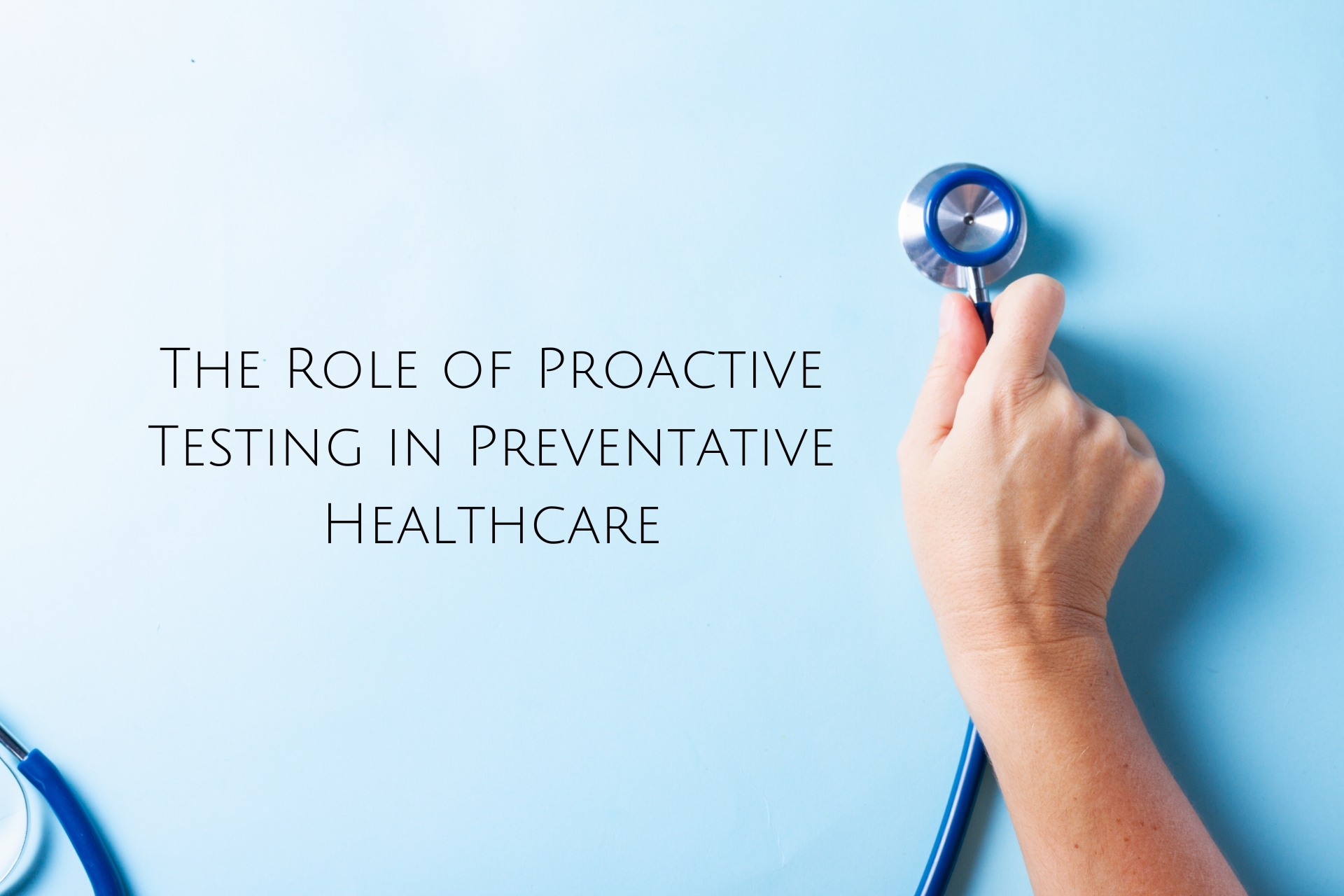The Rise of Preventative Healthcare: How Proactive Testing is Changing the Game
In recent years, there has been a noticeable shift in the healthcare landscape—from a reactive approach that treats illnesses after they occur, to a proactive approach focused on preventative healthcare. This paradigm shift is changing the way we view health, putting a greater emphasis on early detection, lifestyle modification, and minimizing risk before disease manifests. One of the key drivers of this transformation is proactive testing, which is revolutionizing how we approach long-term health and well-being.
In this blog, we’ll explore how proactive testing is influencing the rise of preventative healthcare, its benefits, and the role it plays in early disease detection and prevention.
What is Preventative Healthcare?

Preventative healthcare focuses on measures taken to prevent the onset of diseases and medical conditions before they develop. The goal is to identify risk factors, address lifestyle habits, and make early interventions to reduce the likelihood of chronic conditions like heart disease, diabetes, cancer, and others. Unlike traditional healthcare, which tends to focus on treating illnesses after symptoms appear, preventative healthcare is about promoting overall wellness and intervening early to avoid serious health complications.
Preventative healthcare can take many forms, including:
- Regular health screenings and testing (e.g., blood pressure checks, cholesterol levels, cancer screenings).
- Vaccinations to prevent diseases.
- Lifestyle changes, such as improving diet, exercise, and mental health.
- Monitoring and managing chronic conditions like hypertension or high cholesterol before they escalate.
Proactive testing is one of the cornerstones of preventative healthcare, allowing individuals and healthcare providers to assess and manage risks long before a health crisis occurs.
The Role of Proactive Testing in Preventative Healthcare
Proactive testing refers to medical tests and screenings conducted before symptoms of disease appear. The goal is to identify potential health risks and conditions early when they are most treatable or manageable. Proactive testing allows individuals to take control of their health by gaining insight into their potential health risks and taking steps to mitigate them.
Here are some of the key ways proactive testing is shaping preventative healthcare:
1. Early Detection of Diseases
Many serious health conditions, such as cancer, heart disease, and diabetes, may not show symptoms until they are in an advanced stage. Proactive testing helps detect these conditions early when they are easier to treat or even prevent. For instance:
- Blood tests can identify elevated cholesterol or blood sugar levels that might lead to heart disease or diabetes.
- Cancer screenings, such as mammograms, colonoscopies, and Pap smears, help detect cancers in their early stages, improving the chances of successful treatment.
- Genetic testing can help identify individuals who are at high risk for certain hereditary conditions, such as breast cancer (BRCA gene mutations), which can lead to more informed decision-making regarding lifestyle changes or preventive treatments.
2. Personalized Health and Tailored Prevention
One of the greatest advantages of proactive testing is its ability to offer personalized insights into an individual’s health. With advanced testing, healthcare providers can assess not only general health metrics but also factors unique to each person, such as genetic makeup, lifestyle habits, and family history.
For example, genetic testing can reveal whether an individual has a predisposition to certain conditions, like Alzheimer’s disease or heart disease. With this information, individuals can take proactive steps, such as making dietary adjustments, starting a fitness regimen, or opting for early interventions to mitigate their risk.
Tailored prevention strategies based on personalized data are much more effective than general advice and can greatly improve long-term health outcomes.
3. Improved Chronic Disease Management
Proactive testing plays an important role in managing chronic diseases before they spiral out of control. For individuals already diagnosed with conditions like hypertension, diabetes, or asthma, proactive testing helps to monitor their health status over time and adjust treatments accordingly. Regular testing of blood pressure, blood sugar levels, and lung function ensures that any complications are detected early, potentially preventing hospitalization or the progression of the condition.
For example, continuous monitoring of glucose levels in individuals with diabetes allows for more effective control of blood sugar, reducing the risk of complications like kidney failure, blindness, or heart disease. Similarly, proactive testing for cholesterol and lipid panels can prevent cardiovascular disease by addressing abnormal levels before they cause heart attacks or strokes.
4. Reducing Healthcare Costs
While proactive testing may involve upfront costs, it can ultimately lead to substantial savings by reducing the need for more expensive treatments and hospitalizations in the future. By catching potential health issues early, proactive testing can prevent complications that would require costly emergency care, surgeries, or long-term treatments.
For example, catching high blood pressure early can prevent costly heart surgeries or strokes, and identifying high cholesterol levels can avoid heart attacks or the need for bypass surgery. In the long run, early intervention is far less expensive than managing an advanced illness.
5. Promoting Lifestyle Changes
Proactive testing often reveals aspects of health that individuals may not have been aware of, prompting lifestyle changes to address potential risk factors. Blood tests that reveal high cholesterol or blood sugar levels can encourage individuals to adopt healthier diets, increase physical activity, and lose weight. Similarly, genetic tests that show a predisposition to certain conditions can motivate people to make preventive lifestyle choices before symptoms develop.
By providing concrete evidence of risk factors, proactive testing empowers individuals to make informed decisions about their health and adopt healthier habits, reducing their long-term risk of developing chronic diseases.
6. Mental Health and Stress Management
Mental health is another area where proactive testing is gaining traction. Genetic tests, hormonal screenings, and brain scans are being used to assess the likelihood of developing conditions like depression, anxiety, or bipolar disorder. With early identification of mental health risks, individuals can take steps to manage stress, improve sleep, and seek therapy or medication before their condition becomes debilitating.
Additionally, regular check-ins through mental health screenings or assessments can help detect subtle shifts in mood or behavior, giving individuals and providers the opportunity to intervene early and prevent more severe mental health crises.
The Future of Preventative Healthcare: At-Home Testing and Digital Health
The rise of preventative healthcare and proactive testing is also being fueled by technological advancements. At-home testing kits for conditions like diabetes, cholesterol, and even genetic predisposition to certain diseases are becoming increasingly popular. These tests allow individuals to monitor their health from the comfort of their homes, empowering them to take a more active role in their well-being.
In addition, digital health technologies such as wearables (e.g., smartwatches that monitor heart rate, sleep patterns, and activity levels) and mobile health apps are providing real-time data that can help individuals track their health and detect early signs of trouble. These tools also allow healthcare providers to remotely monitor patients and intervene when necessary.
Conclusion
The rise of preventative healthcare and proactive testing is transforming the way we approach health and wellness. By focusing on early detection, personalized prevention strategies, and continuous monitoring, individuals are better equipped to manage their health and prevent the onset of chronic conditions. As healthcare continues to evolve, proactive testing will play an increasingly pivotal role in creating a healthier, more informed population.
Taking advantage of proactive testing is not just about detecting diseases early; it’s about fostering a culture of prevention and wellness. By embracing a proactive approach to health, we can reduce healthcare costs, improve quality of life, and ensure a healthier future for all.
Recent Posts
-
Exploring the Evolutionary Role of Bacteria-Fungi Symbiosis in Cell Development
The intricate relationships between microorganisms have long fascinated scientists. Among these, the
-
From Stress to Serenity: Real-Life Success Stories of Adaptogen Use
While lifestyle changes like exercise, meditation, and a healthy diet are essential for managing str
-
The Long-Term Effects of Chemical Exposure on Human Health
The Long-Term Effects of Chemical Exposure on Human Health Chemical exposure is an inevitable part o





